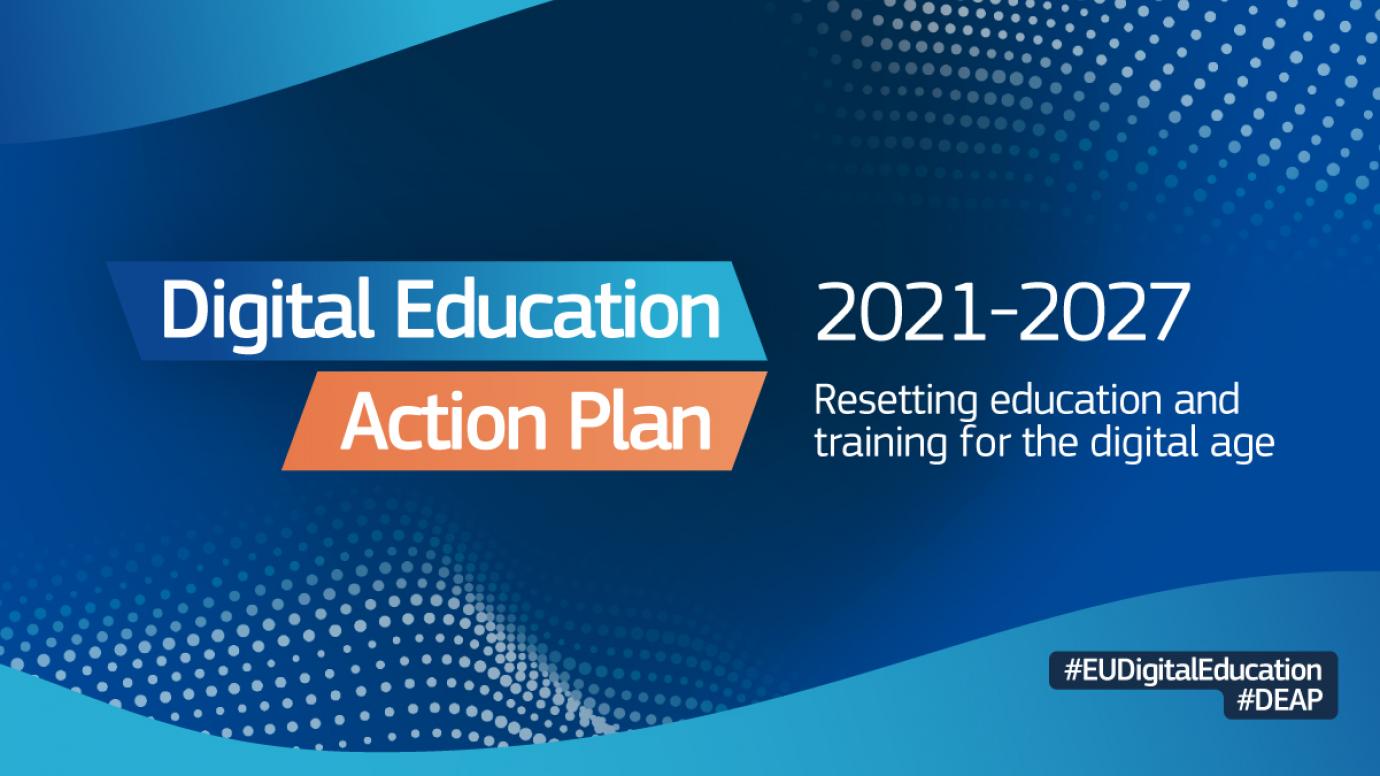What is the Digital Education Action Plan?
The Digital Education Action Plan (2021-2027) is a renewed European Union (EU) policy initiative that sets out a common vision of high-quality, inclusive and accessible digital education in Europe, and aims to support the adaptation of the education and training systems of Member States to the digital age.
The Action Plan, adopted on 30 September 2020, is a call for greater cooperation at European level on digital education to address the challenges and opportunities of the COVID-19 pandemic, and to present opportunities for the education and training community (teachers, students), policy makers, academia and researchers on national, EU and international level.
The initiative contributes to the Commission’s priority ‘A Europe fit for the Digital Age’ and to Next Generation EU. It also supports the Recovery and Resilience Facility, which aims to create a greener, more digital and resilient European Union.
The Digital Education Action Plan is a key enabler to realising the vision of achieving a European Education Area by 2025. It contributes to achieving the goals of the European Skills Agenda, the European Social Pillar Action Plan and the ‘2030 Digital Compass: the European way for the Digital Decade’.
To inform the proposal, from July to September 2020, the Commission launched an open public consultation to gather the views and experiences of all citizens, institutions and organisations.
The actions of the Digital Education Action Plan
The Digital Education Plan sets out two strategic priorities and fourteen actions to support them:
Priority 1: Fostering the development of a high-performing digital education ecosystem
What will the European Commission do to achieve this?
- Action 1: Structured Dialogue with Member States on digital education and skills
- Action 1: Council recommendation on the key enabling factors for successful digital education and training
- Action 2: Council Recommendation on blended learning approaches for high-quality and inclusive primary and secondary education
- Action 3: European Digital Education Content Framework
- Action 4: Connectivity and digital equipment for education and training
- Action 5: Digital transformation plans for education and training institutions
- Action 6: Ethical guidelines on the use of AI and data in teaching and learning for educators
Priority 2: Enhancing digital skills and competences for the digital transformation
What will the European Commission do to achieve this?
- Action 7: Common guidelines for teachers and educators to foster digital literacy and tackle disinformation through education and training
- Action 8: Updating the European Digital Competence Framework to include AI and data-related skills
- Action 9: European Digital Skills Certificate (EDSC)
- Action 10: Council recommendation on improving the provision of digital skills in education and training
- Action 11: Cross-national collection of data and an EU-level target on student digital skills
- Action 12: Digital Opportunity Traineeships
- Action 13: Women’s participation in STEM
- European Digital Education Hub
The European Digital Education Hub
To support both priority areas, the Commission will also establish a European Digital Education Hub strengthening cooperation and exchange in digital education at the EU level.
Why is action needed?
Digital transformation has changed society and the economy with an ever deepening impact on everyday life, and demonstrated the need for higher levels of digital capacity of education and training systems and institutions.
The COVID-19 pandemic has further accelerated the existing trend towards online and hybrid learning. It uncovered new and innovative ways for students and educators to organise their teaching and learning activities and to interact in a more personal and flexible manner online. In parallel, the uptake of digital technologies for education revealed challenges and inequalities between those who have access to digital technologies and those who do not (including individuals from disadvantaged backgrounds); and challenges related to the digital capacities of education and training institutions, teacher training and overall levels of digital skills and competences.
These changes called for a strong and coordinated effort at the EU level to support education and training systems to address the challenges identified and exacerbated by the COVID-19 pandemic, while putting forward a long-term vision for the way ahead for European digital education.
The figures also speak for themselves:
- a 2018 Organisation for Economic Co-operation and Development (OECD) study found that on average less than 40% of educators across the EU felt ready to use digital technologies in teaching, with divergences between EU Member States
- more than one third of 13-14 year olds who participated in the International Computer and Information Literacy Study (ICILS) in 2018 did not possess the most basic proficiency level in digital skills
- a quarter of low-income households have no access to computers and broadband, with divergences across the EU affected by household income (Eurostat, 2019)
- 95% of the respondents of the Open Public Consultation of the Digital Education Action Plan consider that the COVID-19 pandemic marks a turning point for how technology is used in education and training (Digital Education Action Plan, Open Public Consultation, 2020)
First Digital Education Action Plan
The Digital Education Action Plan (2021-2027) builds on the first Digital Education Action Plan (2018-2020).
Get in touch
The Digital Education Action Plan is coordinated by the Directorate-General for Education, Youth, Sport and Culture’s (DG EAC) Digital Education unit.
To find out more about the Digital Education Action Plan, get in touch with us by email at
EAC-DIGITALEDUCATION@ec.europa.eu.



